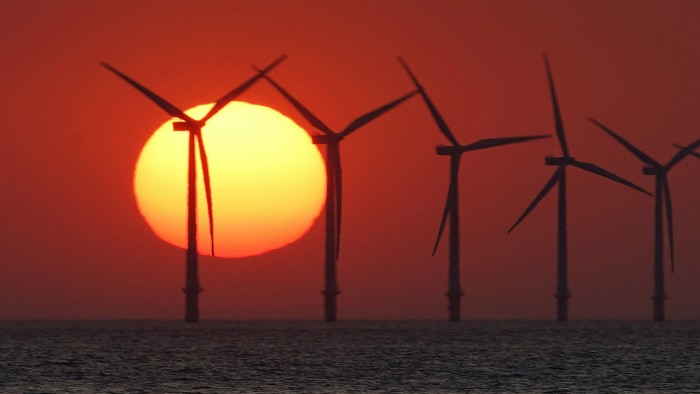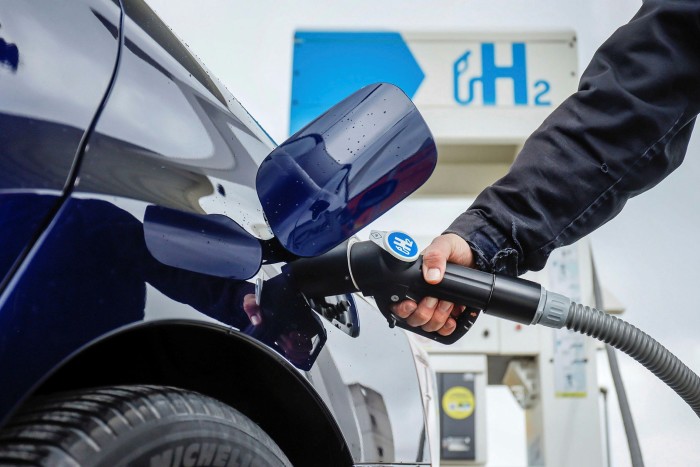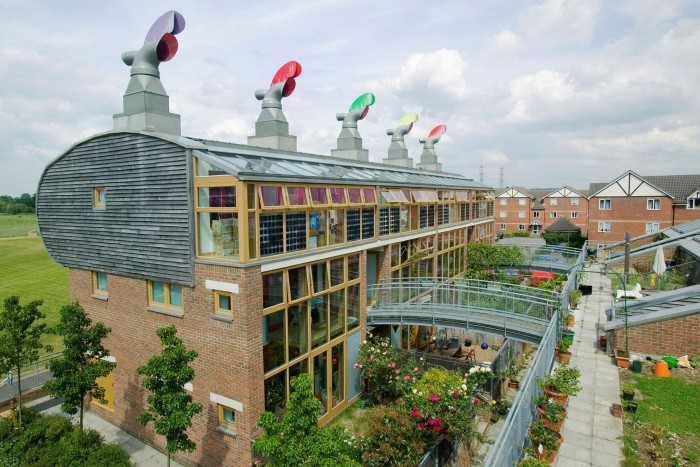Johnson heralds UK green investment to meet climate targets

Roula Khalaf, Editor of the FT, selects her favourite stories in this weekly newsletter.
Boris Johnson is drawing up a package of green energy policies to help the UK meet its ambitious climate targets — including hydrogen fuel, carbon capture and storage, more wind farms and bringing forward the ban on the sale of new petrol cars.
The prime minister is expected to unveil the multibillion-pound initiatives at the end of October, just as the jobs furlough scheme comes to an end, in an attempt to show the government has a long-term economic plan beyond the coronavirus pandemic.
Mr Johnson will give a taste of his ambition on Tuesday at the Conservative conference, with a promise to invest £160m in building the next generation of wind turbines.
Britain is the world’s largest user of offshore wind power, with about 10 gigawatts of capacity installed. Mr Johnson will repeat a pre-election pledge from last November to increase the 2030 target for offshore power generation from 30GW to 40GW.
Current offshore wind generation would be quadrupled within 10 years under the new target, an effort that would require about £50bn in capital investment, according to calculations from Aurora Energy Research.
Floating wind turbines will also get a boost under the government’s plan, with a new target of 1GW of such installations by 2030. Floating turbines are suitable for deep ocean waters — they are typically moored to the seafloor with cables — but the technology is much more expensive than traditional turbines, which stand directly on the seabed.
The cost of subsidising wind power has fallen rapidly in recent years relative to alternative power sources such as nuclear.

Downing Street officials have indicated that plans to borrow £100bn over the five-year parliament for capital spending are likely to be rebadged as a “clean energy and infrastructure growth package”.
Mr Johnson was expected to make a green speech in the summer but this was derailed as the government grappled with the pandemic.
Among Mr Johnson’s priorities are a new focus on hydrogen-fuelled trucks, trains and aircraft, retrofitting homes and more money to be spent on carbon capture and storage technology. Longer-term goals include expanding to other sectors the use of hydrogen as a source of power.
Carbon capture and storage, in which carbon dioxide emissions from fossil fuel use are sequestered underground, has had a chequered history in the UK with previous governments flip-flopping over whether to deliver on funding pledges.
But last week Mr Johnson told a virtual UN climate roundtable: “We want to lead on carbon capture and storage, a technology I barely believed was possible, but I am now a complete evangelist for.”
The government announced in 2017 that it would ban the sale of new petrol and diesel cars, as well as hybrids, from the year 2040.
In February this year it launched a consultation on whether to bring forward that date to between 2030 and 2035 and an announcement is imminent.
The prime minister is also set to encourage the use of small modular reactors — a type of small nuclear generator that could in theory be rolled out more easily than large nuclear reactors.

An energy white paper, which could come as early as this month, is expected to give investors more clarity over the government’s plans to increase low-carbon electricity generation, making up for the phase-out of coal-fired power stations.
Other themes being considered for the Johnson package include: synthetic fuel made by extracting CO2 from the atmosphere and combining it with hydrogen produced from renewable energy; energy-efficient housing that stays warm in winter and cool in summer; and the development of “smart cities”, which use energy more effectively.
The business department has asked for more funding for hydrogen fuel, carbon capture and storage, and offshore wind in its submission to the Treasury’s looming comprehensive spending review.
Mr Johnson is conscious that the eyes of the world are on the UK because it is set to chair the next round of UN climate talks, dubbed COP26, which have been delayed from November to next year because of the pandemic.
The prime minister is also hosting an online event on December 12 to mark the five-year anniversary of the Paris Agreement on climate change.
Number 10 is still considering whether to end the financing of fossil fuel projects overseas, with a possible exemption for gas power plants, through new restrictions on UK Export Finance, the export credit agency that provides state loans and guarantees to British companies abroad.
Ministers were stung by a backlash against a recent government commitment to provide more than $1bn in support for a gas project in Mozambique.
The Conservative government under former prime minister Theresa May signed up to a 2050 target for achieving “net zero carbon” — whereby any emissions would be balanced by schemes to offset an equivalent amount of greenhouse gases from the atmosphere.
In order to have any chance of meeting that goal, Mr Johnson will acknowledge that more rapid progress needs to be made particularly in making electricity generation, transport and household heating more environmentally friendly.
Twice weekly newsletter

Energy is the world’s indispensable business and Energy Source is its newsletter. Every Tuesday and Thursday, direct to your inbox, Energy Source brings you essential news, forward-thinking analysis and insider intelligence. Sign up here.
When asked about the planned announcement, Downing Street said the prime minister “is committed to tackling climate change and building back greener”.
“It’s certainly the case that ahead of our hosting of COP26 we will be setting out plans covering the whole breadth of government to make progress on our net zero commitment, including transport decarbonisation and our energy white paper.”
Comments